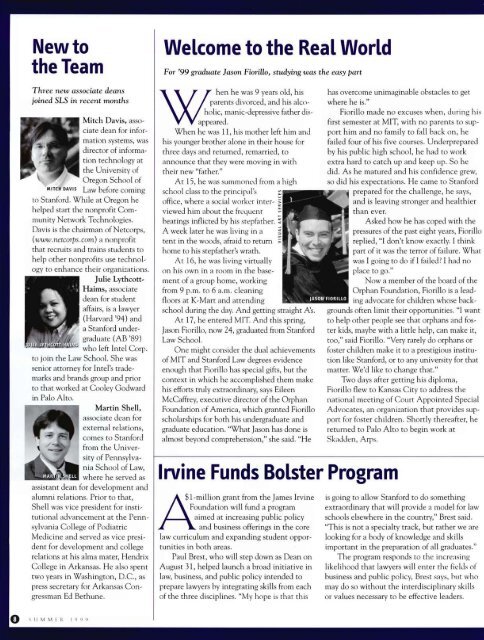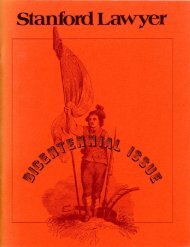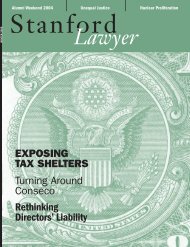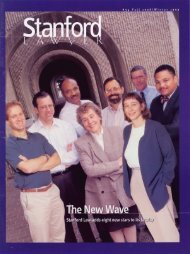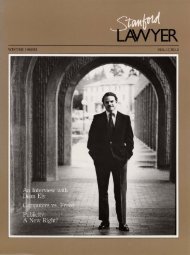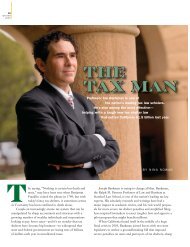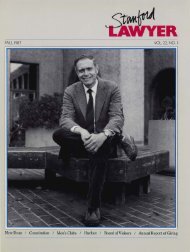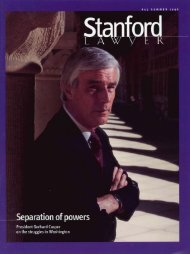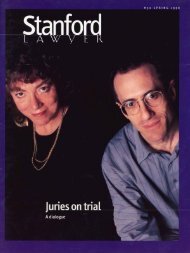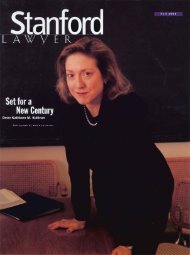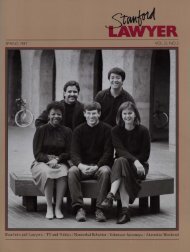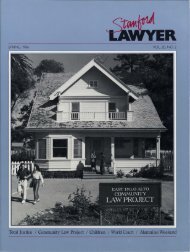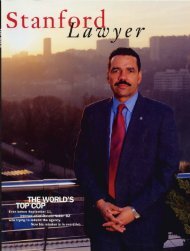Summer 1999 – Issue 55 - Stanford Lawyer - Stanford University
Summer 1999 – Issue 55 - Stanford Lawyer - Stanford University
Summer 1999 – Issue 55 - Stanford Lawyer - Stanford University
- No tags were found...
You also want an ePaper? Increase the reach of your titles
YUMPU automatically turns print PDFs into web optimized ePapers that Google loves.
New tothe TeamThree new associate deansjoined SLS in recent monthsMitch Davis, associatedean for informationsystems, wasdirector of informationtechnology atthe <strong>University</strong> ofOregon School ofMITCH DAVIS Law before comingto <strong>Stanford</strong>. While at Oregon hehelped start the nonprofit CommunityNetwork Technologies.Davis is the chairman ofNetcorps,(www.netcorps.com) a nonprofitthat recruits and trains students tohelp other nonprofits use technologyto enhance their organizations.Julie LythcottHaims, associatedean for studentaffairs, is a lawyer(Harvard '94) anda <strong>Stanford</strong> undergraduate(AB '89)who left Intel Corp.to join the Law School. She wassenior attorney for Intel's trademarksand brands group and priorto that worked at Cooley Godwardin Palo Alto.Martin Shell,associate dean forexternal relations,comes to <strong>Stanford</strong>from the <strong>University</strong>of PennsylvaniaSchool of Law,where he served asassistant dean for development andalumni relations. Prior to that,Shell was vice president for institutionaladvancement at the PennsylvaniaCollege of PodiatricMedicine and served as vice presidentfor development and collegerelations at his alma mater, HendrixCollege in Arkansas. He also spenttwo years in Washington, D.C., aspress secretary for Arkansas CongressmanEd Bethune.Welcome to the Real WorldFor '99 graduate Jason Fiorillo, studying was the easy partWhen he was 9 years old, hisparents divorced, and his alcoholic,manic-depressive father disappeared.When he was 11, his mother left him andhis younger brother alone in their house forthree days and returned, remarried, toannounce that they were moving in withtheir new "father."At 15, he was summoned from a highschool class to the principal's :::office, where a social worker inter- ~viewed him about the frequent ~beatings inflicted by his stepfather. ~A week later he was living in a ~tent in the woods, afraid to return >home to his stepfather's wrath.At 16, he was living virtuallyon his own in a room in the basementof a group home, workingfrom 9 p.m. to 6 a.m. cleaningfloors at K-Mart and attendingschool during the day. And getting straight !\s.At 17, he entered MIT. And this spring,Jason Fiorillo, now 24, graduated from <strong>Stanford</strong>Law School.One might consider the dual achievementsof MIT and <strong>Stanford</strong> Law degrees evidenceenough that Fiorillo has special gifts, but thecontext in which he accomplished them makehis efforts truly extraordinary, says EileenMcCaffrey, executive director of the OrphanFoundation of America, which granted Fiorilloscholarships for both his undergraduate andgraduate education. "What Jason has done isalmost beyond comprehension," she said. "HeIrvine Funds Bolster Program~l-milliongrant from the James IrvineFoundation will fund a programaimed at increasing public policyand business offerings in the corelaw curriculum and expanding student opportunitiesin both areas.Paul Brest, who will step down as Dean onAugust 31, helped launch a broad initiative inlaw, business, and public policy intended toprepare lawyers by integrating skills from eachof the three disciplines. "My hope is that thishas overcome unimaginable obstacles to getwhere he is."Fiorillo made no excuses when, during hisfirst semester at MIT, with no parents to supporthim and no family to fall back on, hefailed four of his five courses. Underpreparedby his public high school, he had to workextra hard to catch up and keep up. So hedid. As he matured and his confidence grew,so did his expectations. He came to <strong>Stanford</strong>prepared for the challenge, he says,and is leaving stronger and healthierthan ever.Asked how he has coped with thepressures of the past eight years, Fiorilloreplied, "I don't know exactly. I thinkpart of it was the terror of failure. Whatwas I going to do if! failed? I had noplace to go."Now a member of the board of theOrphan Foundation, Fiorillo is a lead-I ing advocate for children whose backgroundsoften limit their opportunities. "I wantto help other people see that orphans and fosterkids, maybe with a little help, can make it,too," said Fiorillo. "Very rarely do orphans orfoster children make it to a prestigious institutionlike <strong>Stanford</strong>, or to any university for thatmatter. We'd like to change that."Two days after getting his diploma,Fiorillo flew to Kansas City to address thenational meeting ·of Court Appointed SpecialAdvocates, an organization that provides supportfor foster children. Shortly thereafter, hereturned to Palo Alto to begin work atSkadden, Arps.is going to allow <strong>Stanford</strong> to do somethingextraordinary that will provide a model for lawschools elsewhere in the country," Brest said."This is not a specialty track, but rather we arelooking for a body of knowledge and skillsimportant in the preparation of all graduates."The program responds to the increasinglikelihood that lawyers will enter the fields ofbusiness and public policy, Brest says, hut whomay do so without the interdisciplinary skillsor values necessary to be effective leaders.


